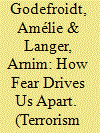|
|
|
Sort Order |
|
|
|
Items / Page
|
|
|
|
|
|
|
| Srl | Item |
| 1 |
ID:
175734


|
|
|
|
|
| Summary/Abstract |
A central aim of terrorism is to drive people apart and destroy social trust. Still, there is little empirical research which has systematically investigated the relationship between terrorist attacks, fear of terrorism, and social trust. In addition, the impact of terrorism is usually assumed to be uniform across different individuals and societies. In order to investigate the impact of terrorism as well as the fear of future terrorism on trust levels of different types of individuals and societies, we combine individual-level survey data of the most recent World Values Survey (WVS, Round 6, 2010–2014) with several indicators at the country-level. Our findings show that social trust is principally damaged by the fear of future terrorist attacks, more so than by past terrorist attacks. Moreover, this deleterious impact of the fear of terrorism on social trust is most prevalent in more democratic countries and among individuals who are more frequently exposed to television news. Hence, with relatively limited capabilities and resources, terrorists may therefore evoke disproportionate fear effects within democratic societies which are, at least partially, fueled by media exposure.
|
|
|
|
|
|
|
|
|
|
|
|
|
|
|
|
| 2 |
ID:
154358


|
|
|
|
|
| Summary/Abstract |
The causes and consequences of the Boko Haram insurgency as well as its possible solutions have been subjected to different interpretations among scholars, politicians, and journalists. Little is known, however, about how the Nigerian populace thinks about the uprising. The present study contributes to the literature on Boko Haram by analyzing the perceptions of Nigerian students vis-à-vis Boko Haram's agenda and the government's response. The results demonstrate a north–south divide with Christians or Igbo and Muslims or Hausa-Fulani holding different ideas on the causes of the crisis, being differently affected by it, and slightly disagreeing on the desirability of military government responses. In conclusion, perceptions on Boko Haram lay bare ethno-religious fault lines reflecting existing grievances, thereby possibly undermining efforts at nation-building and peaceful coexistence in the multi-ethnic Nigerian society.
|
|
|
|
|
|
|
|
|
|
|
|
|
|
|
|
|
|
|
|
|